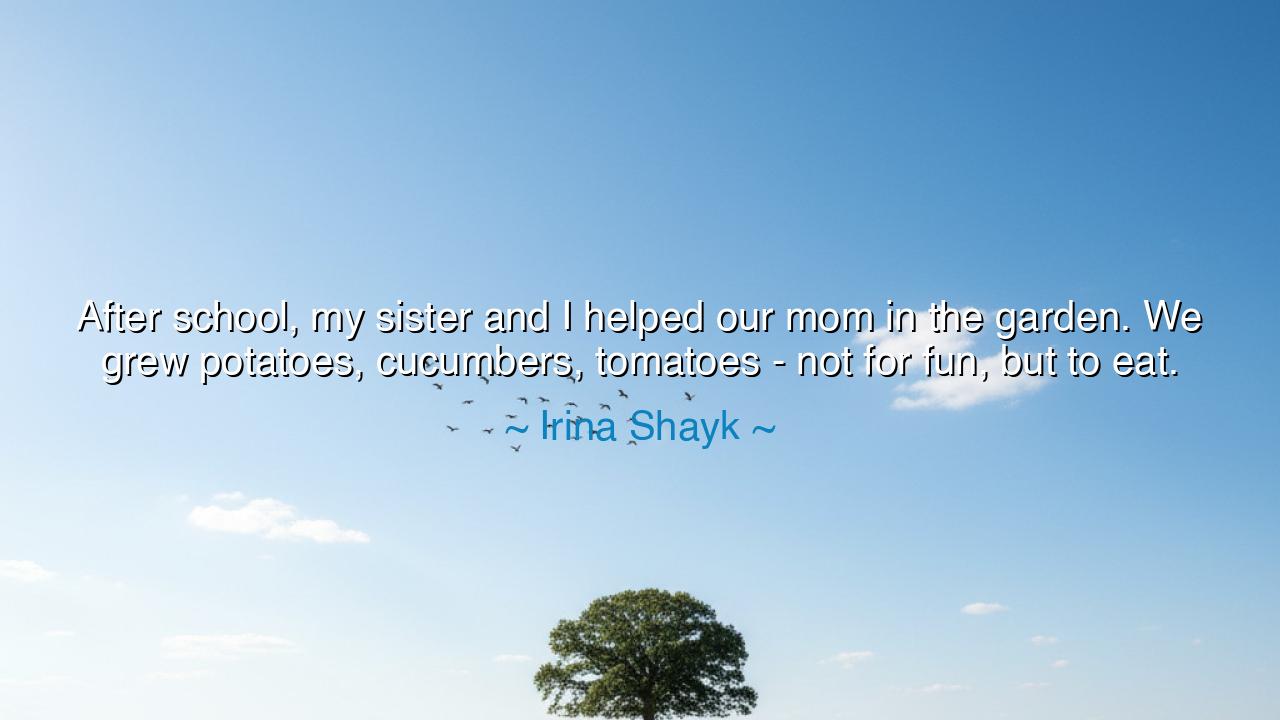
After school, my sister and I helped our mom in the garden. We
After school, my sister and I helped our mom in the garden. We grew potatoes, cucumbers, tomatoes - not for fun, but to eat.






Hear the remembrance of Irina Shayk, who spoke of her youth with simplicity yet great weight: “After school, my sister and I helped our mom in the garden. We grew potatoes, cucumbers, tomatoes—not for fun, but to eat.” Do not take these words lightly, for within them lies a lesson older than kingdoms and empires: that life’s truest strength is born not in luxury, but in necessity, and that labor done with family is labor that binds souls together.
This utterance is a testimony to humility and survival. In the rich lands of history, many children ran in play after school, yet for Irina, the day’s lessons continued in the soil. There, with her hands in the earth, she and her sister learned truths that no book could fully teach—that food is sacred, that toil gives value, and that nothing in life comes without cost. The garden was no pastime; it was a table of life itself, upon which the family’s strength depended.
The ancients honored such labor. In Rome, the noble Cincinnatus left his plow to lead the republic, and when his duty was done, he returned once more to the soil. In his garden he found both sustenance and virtue, and in that same earth Irina and her family found resilience. For the ground teaches us to sow and to reap, to endure seasons of want, and to rejoice in seasons of plenty. To eat from one’s own labor is to be connected to the eternal rhythm of life.
Her words also reveal the burden of necessity. The potatoes, cucumbers, and tomatoes were not cultivated as games for children, but as provisions against hunger. This truth is a reminder of the millions who have tilled the earth not as pastime but as survival. The laughter of play was replaced with the discipline of work, yet within that hardship a deeper gift was hidden: the spirit of endurance, the shaping of character. Those who have worked for bread with their own hands understand gratitude more profoundly than those who have always received without effort.
Consider also the story of George Washington Carver, who, born into poverty, turned his childhood labors in the soil into a lifelong passion that transformed agriculture itself. Where others saw hardship, he saw opportunity, and from the humblest beginnings he cultivated wisdom that would feed countless lives. In the same way, Irina’s memories show that struggle, when embraced, can plant seeds of greatness that bloom far beyond the field.
What, then, is the lesson for us? It is that we must not despise the humble work nor forget the roots of our sustenance. To labor for one’s food is to honor the earth, to strengthen the body, and to humble the spirit. Gratitude must always be linked to the bread we eat, for every loaf, every fruit, every meal is born of someone’s labor—whether ours or another’s.
Practical actions are clear: cultivate gratitude before every meal; if possible, plant even a small garden to remind yourself of the bond between labor and sustenance; teach children not only to consume but to contribute, that they may grow in appreciation. And above all, remember that struggle is not shame—it is the soil from which resilience grows.
Thus, let the words of Irina Shayk be carried forward as wisdom: that in the garden, through sweat and necessity, she and her family discovered life’s deeper truths. Let us also bend to the soil of our lives, laboring with gratitude, enduring with strength, and remembering always that the fruits of today are born of yesterday’s toil. In this, we become not just consumers of the earth, but stewards of its eternal gift.






AAdministratorAdministrator
Welcome, honored guests. Please leave a comment, we will respond soon